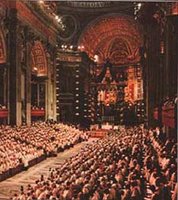Thursday, October 26, 2006
Sacrosanctum Concilium 11
 The council bishops recognized that the old legalistic/minimalist approach was a millstone around our necks.
But in order that the liturgy may be able to produce its full effects, it is necessary that the faithful come to it with proper dispositions, that their minds should be attuned to their voices, and that they should cooperate with divine grace lest they receive it in vain (Cf. 2 Cor. 6:1.) . Pastors of souls must therefore realize that, when the liturgy is celebrated, something more is required than the mere observation of the laws governing valid and licit celebration; it is their duty also to ensure that the faithful take part fully aware of what they are doing, actively engaged in the rite, and enriched by its effects.
This is also the introduction to the oft-repeated council sentiment of full, active, and enriching participation. The council is explicit in stating what is expected of the faithful. Let's review it carefully:
- A proper disposition, which could be interpreted as an openness to the goal of sanctification.
- Importantly, that their interior participation (minds) is attuned to their exterior participation (voices).
This is the huge oversight on the part of modern critics of participation, those who suggest there's too much emphasis on the external. The middle way would suggest that, generally, the community is observing silence and engaged in meditation as well as singing and vocally praying. You can't get around it. Uncooperative believers still have an experience of grace, but the efficacy of the Roman Rite is called into question for those who persistently and stubbornly refuse to engage at the appropriate times.
As spiritual guides, pastors are urged to see that their personal focus is not limited to the rubrics. Their responsibility is the full awareness of the people, their active engagement--external and internal, and that the faith community as a whole experiences spiritual growth as a result of liturgy.
The council bishops recognized that the old legalistic/minimalist approach was a millstone around our necks.
But in order that the liturgy may be able to produce its full effects, it is necessary that the faithful come to it with proper dispositions, that their minds should be attuned to their voices, and that they should cooperate with divine grace lest they receive it in vain (Cf. 2 Cor. 6:1.) . Pastors of souls must therefore realize that, when the liturgy is celebrated, something more is required than the mere observation of the laws governing valid and licit celebration; it is their duty also to ensure that the faithful take part fully aware of what they are doing, actively engaged in the rite, and enriched by its effects.
This is also the introduction to the oft-repeated council sentiment of full, active, and enriching participation. The council is explicit in stating what is expected of the faithful. Let's review it carefully:
- A proper disposition, which could be interpreted as an openness to the goal of sanctification.
- Importantly, that their interior participation (minds) is attuned to their exterior participation (voices).
This is the huge oversight on the part of modern critics of participation, those who suggest there's too much emphasis on the external. The middle way would suggest that, generally, the community is observing silence and engaged in meditation as well as singing and vocally praying. You can't get around it. Uncooperative believers still have an experience of grace, but the efficacy of the Roman Rite is called into question for those who persistently and stubbornly refuse to engage at the appropriate times.
As spiritual guides, pastors are urged to see that their personal focus is not limited to the rubrics. Their responsibility is the full awareness of the people, their active engagement--external and internal, and that the faith community as a whole experiences spiritual growth as a result of liturgy.